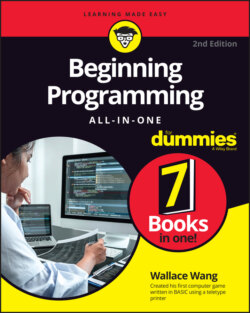Читать книгу Beginning Programming All-in-One For Dummies - Wallace Wang - Страница 70
Choosing a curly-bracket language
ОглавлениеIf you plan to write programs professionally, you’ll probably need to know a curly-bracket language. If you know C, C++, Java, or C#, you can pick up any of the other curly-bracket languages fairly easily:
Knowing C can be great because it’s the basis for all the other languages. Plus, while figuring out C, you can get used to its cryptic syntax without having to worry about understanding object-oriented programming at the same time.
Begin with C++ if you want to get started using object-oriented programming based on your knowledge of C. While figuring out C++, you can ignore its object-oriented features. After you feel comfortable with writing C++ programs, you can gradually start developing object-oriented programming techniques as well.
If you want to write programs that can run on different computers, use Java. Java forces you to know object-oriented programming right from the start (like C#), so knowing Java means you can figure out object-oriented programming at the same time. Because Java isn’t as confusing as C or C++, understanding Java first is likely much easier than understanding C or C++.
If you want to learn a safer version of C, consider trying C# or Python. The C# language is quickly becoming the standard language for writing Windows programs, while Python is popular for being easier to learn than C and being nearly as versatile as C.
As long as you know at least one curly-bracket language, you know one of the most popular programming languages in the world.
